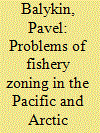| Srl | Item |
| 1 |
ID:
115236


|
|
|
|
|
| Publication |
2012.
|
| Summary/Abstract |
This paper provides a comparative analysis of the social and cultural dimensions of fish hatchery development in Vietnam and Thailand. Two detailed case studies highlight the importance of a variety of culturally mediated, informal interpersonal relationships in facilitating the establishment of new hatchery enterprises. The analysis reveals that in both Vietnam and Thailand, informal relationships are extremely effective conduits for the transfer of productive technologies from public institutions to private entrepreneurs and for the subsequent development of private enterprises. It is concluded that if current policies aimed at promoting private sector development are to be more successful, they must be better tailored to the contours of specific cultural geographies in locations where they are implemented.
|
|
|
|
|
|
|
|
|
|
|
|
|
|
|
|
| 2 |
ID:
190649


|
|
|
|
|
| Summary/Abstract |
Although exclusive common pool resource management regimes have locally been applied since time immemorial in many coastal and fjord areas, in the legal conceptualization of space, the oceans and their living resources were traditionally treated as a “global commons.” The idea of restricting access to coastal oceanic resources and delegating their governance to state instruments has become increasingly popular since the middle of the previous century when political economy models predicted the eventual overexploitation or degradation of all resources used in common. While state jurisdictions overall continue to preserve the idea of common access to marine living resources for a state’s people, the rapid privatization of marine living resources and the subsequent development of aquaculture over the last few decades, often confront this understanding, leading to enclosure of a delineated maritime area that was initially intended to be accessible to the public. Enclosing the sea for the purpose of aquaculture development leads to a semantic change in property institutions that govern coastal areas and provides for a form of enclosure of the commons in key locations designated for marine aquaculture development. This article explores the concept of “ocean commons” and debates how the enclosure of common areas for the purposes of aquaculture development may collide with Indigenous and local conceptions of common pool resource management. The article applies this theoretical investigation on two examples from Canada and Norway, and suggests that rethinking aquaculture development in coastal waters through the lens of “ocean commons” may provide a guiding ethos for revisiting current approaches of access to the sea and ensuring the harmonious coexistence between aquaculture development and local/Indigenous traditional activities.
|
|
|
|
|
|
|
|
|
|
|
|
|
|
|
|
| 3 |
ID:
164061


|
|
|
|
|
| Summary/Abstract |
This article notes the importance of food security and the serious lag of this industry in recent years. This, according to the author, is largely due to miscalculations in the modern scheme of fishery zoning. The article proposes to update the fishery zoning of the country's seafood supply as a factor of modern methods of marine spatial planning. It also touches on the problems of international rivalry and interaction, including the development of the Northern Sea Route and the prospects of its use in the context of the Maritime Silk Road project of the 21st Century.
|
|
|
|
|
|
|
|
|
|
|
|
|
|
|
|